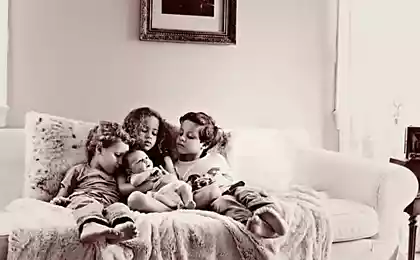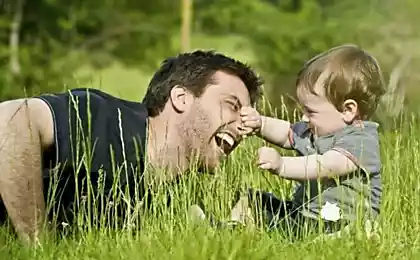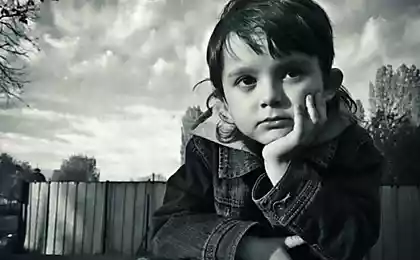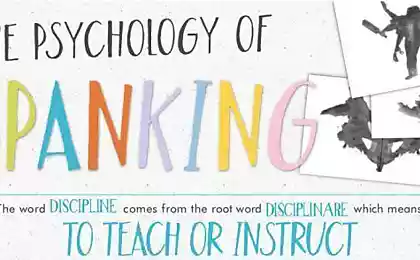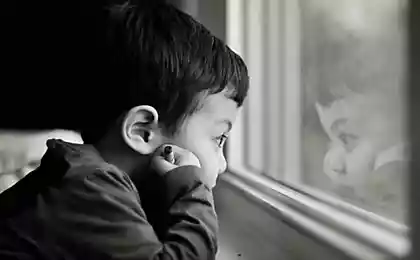761
How parents plan their children’s future
A forty-year-old woman told me how once as a child her strict mother dressed her in a new dress and, sending her to walk outside, in a strict voice said: “If you come dirty, I will kill!”
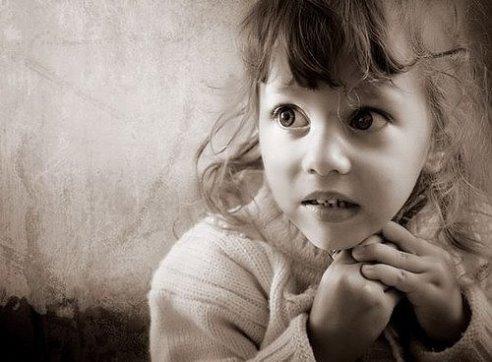
She went into the yard and at first was very afraid to make one awkward move, imagining with horror that something might happen to the dress. But then the kids came out and the game started.
Gradually, fear let her go and she began to play like all children. But in the course of the game, someone pushed her in a ridiculous baby fight. She tripped, fell up, stepped on the edge of the dress. A crackling of fabric was heard, and to her horror she saw her dress - smeared, with the frill torn off. The feeling of horror she remembered for life - she was absolutely sure that now her mother would kill her. She began to cry and cried so desperately that other mothers in the yard gathered around her and began to calm her down. But nothing helped because the child knew that her mother would kill her.
Imagine what shock the girl experienced, what horror she really experienced, if adults, having understood why she was crying, did not even persuade her to calm down, but began to look for a way out of the situation. She was taken home to one of the women, where the dress was removed, washed, ironed to dry. Then she was taken to the next street, where there was a fashion studio. There, the women explained the situation to the employees of the studio - and the torn frill was sewn so that there was no trace left. And only after the girl was convinced that nothing was noticeable, she calmed down.
I described this situation to show you that children take everything seriously, they believe us. We are important people to them. So our opinion, the assessment that they believe to be the absolute truth about them, sometimes sounds like a sentence to them. Especially if we tell them this often, pointing out some of their qualities, ability or inability. They really believe us. And they think our opinion of them is final, like the diagnosis we give them. One mother said to me in a sad voice, doomed:
- I don't remember poetry well. No memory at all!
And I was once again surprised how easily and thoughtlessly parents put their diagnoses, condemning the child to confirm this diagnosis.
- But because you say it to your child, he won’t remember better, I’ve had to say it every time. On the contrary, thanks to you, he already knows that he does not remember well, that he has no memory. He takes this as the ultimate conclusion about him.
We ourselves deprive our children of opportunities for growth, disclosure of some abilities, making such “diagnoses”. I remember being surprised every time I saw my grandson’s drawings – for a long time, he drew real “freaks,” which are drawn by children, not children his age. His peers in kindergarten drew already developed pictures, showing even perspective, scale, reflecting facial expressions of faces - he also drew men on the principle - a dot, a dot, two circles, a mouth, a nose, a cucumber ... I knew that some brain structures had not yet been formed, which is why he paints so primitively and "wrongly" for his age. And none of us, adults, said you can't draw. Time passed, and somehow imperceptible to all of us – the child suddenly began to draw, began to convey perspective, scale, and facial expressions. No one gave him a “final” diagnosis, depriving him of the prospect of drawing.
(How many times, when I asked adults to draw something that they needed in the course of some exercise, I heard: I can’t draw!) "How do you know that?" I asked. - Who told you that? You just start and you can’t fail! Only those who know that they do not know how and do not try. And indeed, sometimes within a few days of training, people begin to be able to draw! Because they simply cancel the “diagnosis” they made in childhood.
Often, it is our parental “diagnoses” that lead to more serious consequences than the ability or inability to do something. Our opinions and assessments sometimes lead children to anxiety, to disbelief in themselves, to giving up, to doom. Even our innocent would seem: "Well, what have you done?" What did you do, I ask you! said in a tragic voice about the not-so-significant act of the child, makes him feel that something terrible has happened. Sometimes, again, without even wanting it, we cause in the child a feeling of irreparability of what happened, doom because he has done something that cannot be changed!
And this can lead to a real tragedy (and such cases happen!) - to the suicide of a child, when he cannot live under the weight of his own guilt and badness, instilled in him, even unconsciously, not intentionally, such punitive parents. We kind of sentence the child to some specific behavior, informing him of the finiteness of his conclusions about him and his actions.
I’ve heard stories from many adults about being “persecuted” by their parents in adulthood. Like my mother’s remark, repeated many times as a child, “Lord!” For many years, a person has caused a feeling of guilt, self-doubt, even the fear of building a serious relationship with a partner. And who is to be punished for this? Why would they want to ruin people’s lives? Like my mother’s “prophecy”: “Nothing good will come out of you!”, said for childish pranks and disobedience – haunted a person all his life.
And in the situation of any failure, so natural for any person living his life, these words popped up in his head as a sentence - said my mother, nothing worthwhile from me will not work. As a "prophecy": "For a bully like you, prison cries!" - came true in the most real sense - sooner or later a person went to prison. (And how many of them who went to prison were programmed as children by parents who gave their children such a dreadful diagnosis!)
Realizing our prophetic, “creative” abilities, we must understand that the child should not learn from us about such hopeless scenarios of his life! To love a child means to teach him in any situation, with any failure or failure to see a perspective, believe in himself, look for and find a way out of any situation. As an adult living an adult life, you know how important this is. It is important not to give up in any situation. How important it is to believe that everything will be fine. But to do that, we need to give the child the opportunity to see the way out, the infinity of any fact, any action.
To help him realize that everything can change, that he has the power to correct the mistake, to become better, stronger. After all, we adults know that everything changes, that everything is “not finite”. This is the knowledge we need to share. That's what we need to tell them. And no one but us will tell our children that they have the ability to remain good even after bad deeds. Maybe this is one of the most important representations we have to form in our children that will really support them in life. For which they will be truly grateful.
And for this - again, you need to help the child understand the reason for his actions - so it will be easier to understand how to change the situation, where to find a way out. And for that, again, we need to have a good look at the child. As a good child, not as a criminal for whom prison is already crying!
It is in these explanations and the belief in a good child who, even if he does a bad deed, has the prospect of correcting himself and remaining a good person – and there is a real expression of love! The child bites – tell him that he will soon grow up and stop biting. That all little kids bite, but then they stop. The child took someone else's thing - because he is still small and can not resist his desires. But he will certainly grow up and learn that each person has his own things and can take them only by asking whether this person will allow him to take the thing that belongs to him. He will learn this and grow up to be an honest man. The child fought, defended himself. But over time, he will realize that you can defend yourself not only by fighting. He will learn to negotiate, he will learn to choose friends with whom he will not have to fight. The child was rude to adults, but he will certainly learn to behave in such a way as not to offend other people, so as not to tear their mood on them. It all comes with age.
The child must know that he is normal. That he's like that. It’s just that he hasn’t learned something yet, he’s done something recklessly. He has the ability to correct all his mistakes. He has the power to change. We need to help children realize that everything is changing. That his shyness will pass over time, that he will definitely have friends, that he will definitely correct the "two" that after the "unrequited" love - another will surely come, that life never ends while you are alive.
That’s why, again, it’s so important for us adults to remember ourselves as little. We need to tell our children that we understand them, because as children, we ourselves sometimes took someone else’s stuff or cheated, fought or got twos. But we grew up to be good, normal people. For our children, we should be models of perspective in life. This is why we need to remember our childhood and talk to our children about our childhood. About the love that you ended so sadly, about your experiences that have passed over time. Your timidity, which has passed with time. You have to deal with the people you are fighting with. There is always room for change for the better!

She went into the yard and at first was very afraid to make one awkward move, imagining with horror that something might happen to the dress. But then the kids came out and the game started.
Gradually, fear let her go and she began to play like all children. But in the course of the game, someone pushed her in a ridiculous baby fight. She tripped, fell up, stepped on the edge of the dress. A crackling of fabric was heard, and to her horror she saw her dress - smeared, with the frill torn off. The feeling of horror she remembered for life - she was absolutely sure that now her mother would kill her. She began to cry and cried so desperately that other mothers in the yard gathered around her and began to calm her down. But nothing helped because the child knew that her mother would kill her.
Imagine what shock the girl experienced, what horror she really experienced, if adults, having understood why she was crying, did not even persuade her to calm down, but began to look for a way out of the situation. She was taken home to one of the women, where the dress was removed, washed, ironed to dry. Then she was taken to the next street, where there was a fashion studio. There, the women explained the situation to the employees of the studio - and the torn frill was sewn so that there was no trace left. And only after the girl was convinced that nothing was noticeable, she calmed down.
I described this situation to show you that children take everything seriously, they believe us. We are important people to them. So our opinion, the assessment that they believe to be the absolute truth about them, sometimes sounds like a sentence to them. Especially if we tell them this often, pointing out some of their qualities, ability or inability. They really believe us. And they think our opinion of them is final, like the diagnosis we give them. One mother said to me in a sad voice, doomed:
- I don't remember poetry well. No memory at all!
And I was once again surprised how easily and thoughtlessly parents put their diagnoses, condemning the child to confirm this diagnosis.
- But because you say it to your child, he won’t remember better, I’ve had to say it every time. On the contrary, thanks to you, he already knows that he does not remember well, that he has no memory. He takes this as the ultimate conclusion about him.
We ourselves deprive our children of opportunities for growth, disclosure of some abilities, making such “diagnoses”. I remember being surprised every time I saw my grandson’s drawings – for a long time, he drew real “freaks,” which are drawn by children, not children his age. His peers in kindergarten drew already developed pictures, showing even perspective, scale, reflecting facial expressions of faces - he also drew men on the principle - a dot, a dot, two circles, a mouth, a nose, a cucumber ... I knew that some brain structures had not yet been formed, which is why he paints so primitively and "wrongly" for his age. And none of us, adults, said you can't draw. Time passed, and somehow imperceptible to all of us – the child suddenly began to draw, began to convey perspective, scale, and facial expressions. No one gave him a “final” diagnosis, depriving him of the prospect of drawing.
(How many times, when I asked adults to draw something that they needed in the course of some exercise, I heard: I can’t draw!) "How do you know that?" I asked. - Who told you that? You just start and you can’t fail! Only those who know that they do not know how and do not try. And indeed, sometimes within a few days of training, people begin to be able to draw! Because they simply cancel the “diagnosis” they made in childhood.
Often, it is our parental “diagnoses” that lead to more serious consequences than the ability or inability to do something. Our opinions and assessments sometimes lead children to anxiety, to disbelief in themselves, to giving up, to doom. Even our innocent would seem: "Well, what have you done?" What did you do, I ask you! said in a tragic voice about the not-so-significant act of the child, makes him feel that something terrible has happened. Sometimes, again, without even wanting it, we cause in the child a feeling of irreparability of what happened, doom because he has done something that cannot be changed!
And this can lead to a real tragedy (and such cases happen!) - to the suicide of a child, when he cannot live under the weight of his own guilt and badness, instilled in him, even unconsciously, not intentionally, such punitive parents. We kind of sentence the child to some specific behavior, informing him of the finiteness of his conclusions about him and his actions.
I’ve heard stories from many adults about being “persecuted” by their parents in adulthood. Like my mother’s remark, repeated many times as a child, “Lord!” For many years, a person has caused a feeling of guilt, self-doubt, even the fear of building a serious relationship with a partner. And who is to be punished for this? Why would they want to ruin people’s lives? Like my mother’s “prophecy”: “Nothing good will come out of you!”, said for childish pranks and disobedience – haunted a person all his life.
And in the situation of any failure, so natural for any person living his life, these words popped up in his head as a sentence - said my mother, nothing worthwhile from me will not work. As a "prophecy": "For a bully like you, prison cries!" - came true in the most real sense - sooner or later a person went to prison. (And how many of them who went to prison were programmed as children by parents who gave their children such a dreadful diagnosis!)
Realizing our prophetic, “creative” abilities, we must understand that the child should not learn from us about such hopeless scenarios of his life! To love a child means to teach him in any situation, with any failure or failure to see a perspective, believe in himself, look for and find a way out of any situation. As an adult living an adult life, you know how important this is. It is important not to give up in any situation. How important it is to believe that everything will be fine. But to do that, we need to give the child the opportunity to see the way out, the infinity of any fact, any action.
To help him realize that everything can change, that he has the power to correct the mistake, to become better, stronger. After all, we adults know that everything changes, that everything is “not finite”. This is the knowledge we need to share. That's what we need to tell them. And no one but us will tell our children that they have the ability to remain good even after bad deeds. Maybe this is one of the most important representations we have to form in our children that will really support them in life. For which they will be truly grateful.
And for this - again, you need to help the child understand the reason for his actions - so it will be easier to understand how to change the situation, where to find a way out. And for that, again, we need to have a good look at the child. As a good child, not as a criminal for whom prison is already crying!
It is in these explanations and the belief in a good child who, even if he does a bad deed, has the prospect of correcting himself and remaining a good person – and there is a real expression of love! The child bites – tell him that he will soon grow up and stop biting. That all little kids bite, but then they stop. The child took someone else's thing - because he is still small and can not resist his desires. But he will certainly grow up and learn that each person has his own things and can take them only by asking whether this person will allow him to take the thing that belongs to him. He will learn this and grow up to be an honest man. The child fought, defended himself. But over time, he will realize that you can defend yourself not only by fighting. He will learn to negotiate, he will learn to choose friends with whom he will not have to fight. The child was rude to adults, but he will certainly learn to behave in such a way as not to offend other people, so as not to tear their mood on them. It all comes with age.
The child must know that he is normal. That he's like that. It’s just that he hasn’t learned something yet, he’s done something recklessly. He has the ability to correct all his mistakes. He has the power to change. We need to help children realize that everything is changing. That his shyness will pass over time, that he will definitely have friends, that he will definitely correct the "two" that after the "unrequited" love - another will surely come, that life never ends while you are alive.
That’s why, again, it’s so important for us adults to remember ourselves as little. We need to tell our children that we understand them, because as children, we ourselves sometimes took someone else’s stuff or cheated, fought or got twos. But we grew up to be good, normal people. For our children, we should be models of perspective in life. This is why we need to remember our childhood and talk to our children about our childhood. About the love that you ended so sadly, about your experiences that have passed over time. Your timidity, which has passed with time. You have to deal with the people you are fighting with. There is always room for change for the better!
Rental of chairs, other furniture necessary for the event of inventory on favorable terms
Repair kit to restore the integrity of the steering rack












